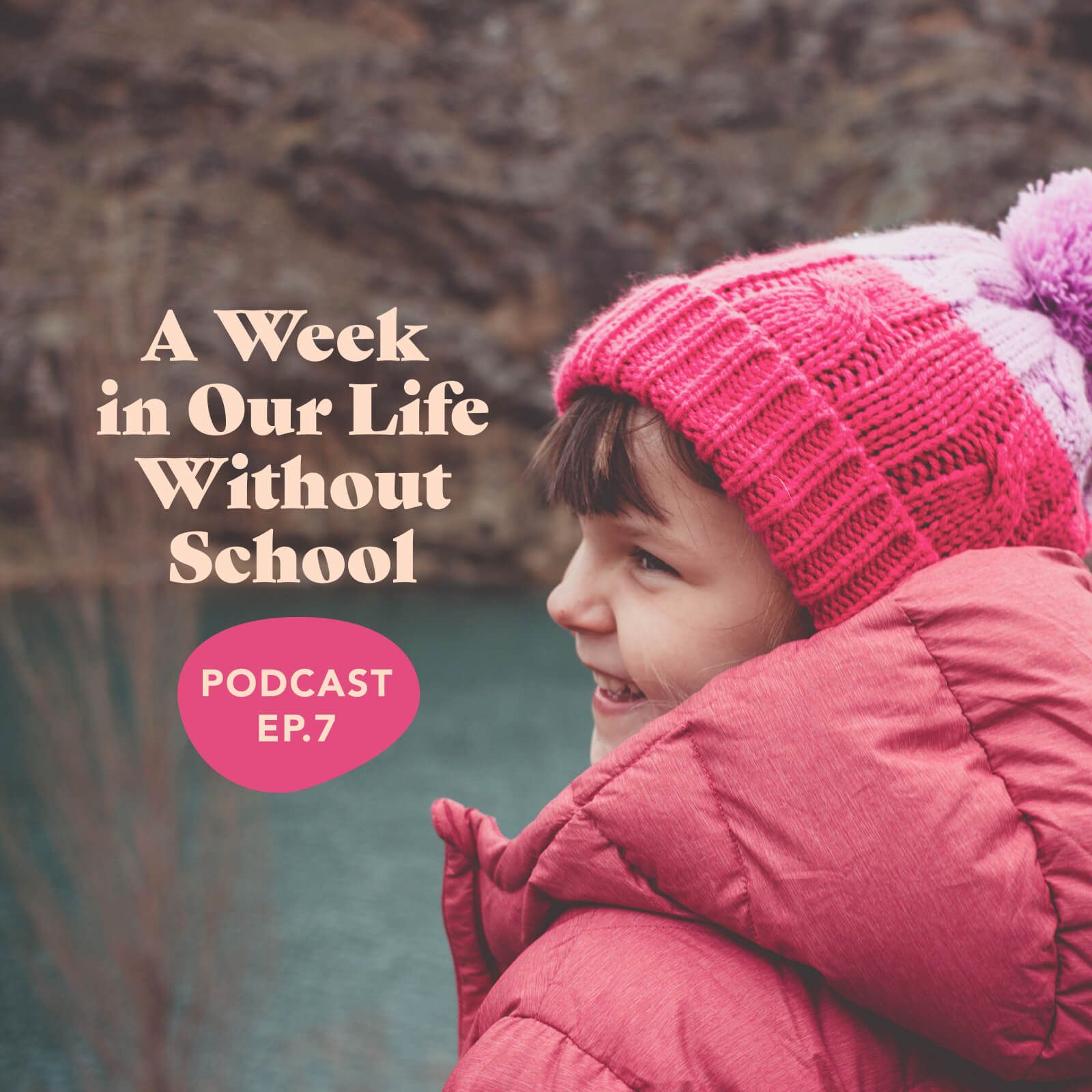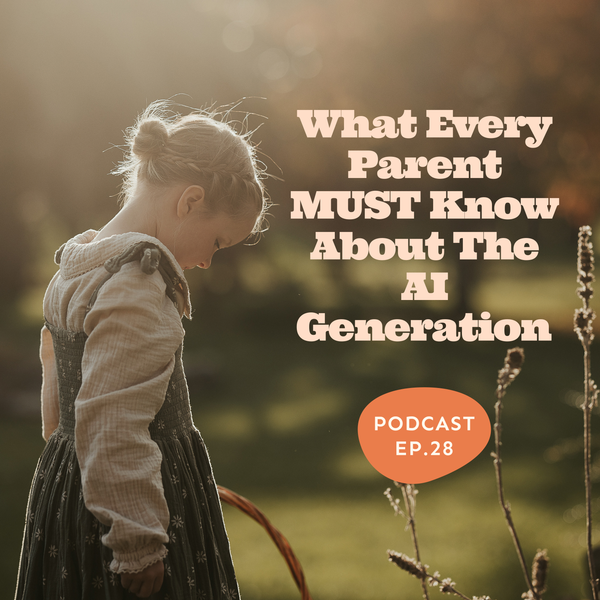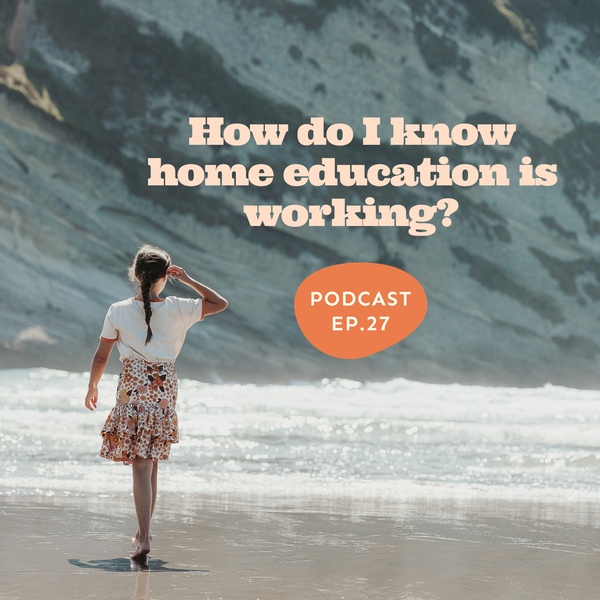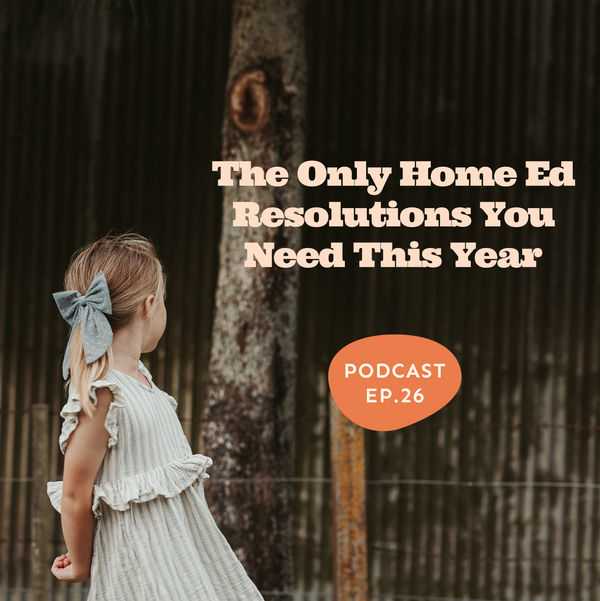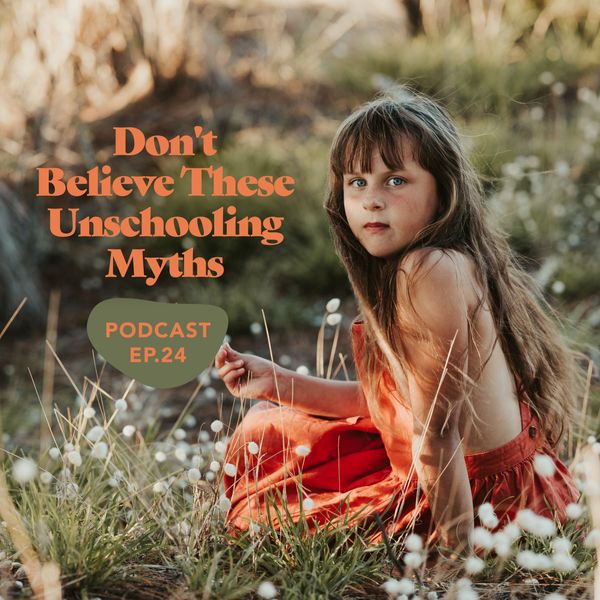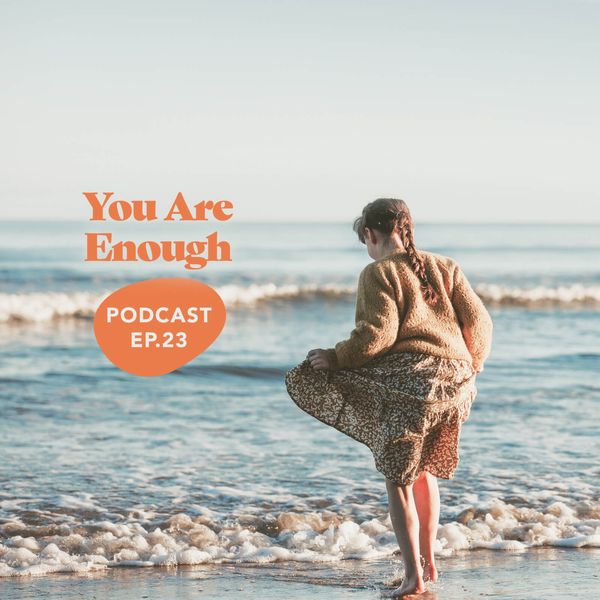A lot of you have asked for a day-in-the-life style episode, so…here it is! I think there’s a stack of important context that should always be shared as part of this kind of conversation, though, so this episode is made up of three parts (if you listen in, please make sure you go right through – taking any of this in isolation just…won’t be as useful):
Part 1 is some of the thinking we went through to arrive at the daily and weekly flow we have.
Part 2 takes you through what that flow looks like for our three older children – who are 6, 11 and 14.
And Part 3 is a few extra thoughts that I think should accompany any day-in-the-life style example. And yes – there is definitely some screen time chat in there.
If you’re struggling to find the right rhythm for your family, I really, really hope there are some things you can take from this!
These private episodes go even deeper, backed by research, the science of how children learn and grow, and more than a decade of lived home educating experience. Each one is designed to help you rethink, reframe, and recalibrate the way you're walking this path, giving you the confidence to live the version of life you want. The Collection is 23 episodes strong and counting, with over 10 hours of listening available right now.
As a subscriber, you'll also get immediate access to my self-paced course, expert-led masterclasses recordings, five downloadable guides, our school exemption documents, and more 💛
Show Notes
- The Skillshare platform I mention that my eldest uses a HEAP for his illustration. It has staaaaaaacks of classes on all sorts of things. (and yep, if you sign up using that link I’ll receive a small payment for recommending it)
- Weekly mini-episodes 🎙️
Complete Transcript
INTRO
Helloooo and welcome to the Life Without School podcast, here to help you and your children live the life you want to, not just the one you’re told you should.
I’m Issy, a writer and unschooling dad from New Zealand.
You can find more about me at starkravingdadblog.com, as well as collections of my favourite posts bundled up into encouraging little guidebooks for anyone walking this road less travelled.
Thank you so much for tuning in to listen today. Alright, let’s get into this week’s episode.
MUSIC
Helloooooo again, from my little corner of the podcasting world. Wherever you are, whatever you’re doing while you’re listening today, thank you so much for tuning in.
A lot of you have asked for a day in the life episode, where I take you through the shape of our days, how we structure things, what we get up to…that kind of stuff. And, I definitely think that’s useful to share, so I’ll be getting into a stack of that today. But I think the conversation that needs to come with it, is how and why we think about certain things that led us to those days. Some of our educational philosophy. Because it’s easy to just share a snapshot of our days, and move on. But, on its own, I don’t think that’s super helpful to you. Our days are ours. They’re unique to us – who we, and what our life circumstances, are. All of that is very personal.
Like – I could tell you about the car we drive, why we think it’s so great, and tell you to buy one too. But…you might spend all that money and then find out it’s the completely wrong vehicle for you. I could give you a list of my favourite movies, and suggest you go and watch them all, but…you might spend months doing that and not enjoy a single one of them.
To me, this day-in-the-life conversation feels a bit like that. The best flow for you and your family is the one that suits you. The one that fits you. The one that serves you. Not, the one I – or anyone else – tells you is best. It is much too tied to personal things for that.
So, let’s start there. Let’s start by saying that I don’t believe there’s one right way to home educate. In fact, I don’t believe there’s one right way to educate, full stop. The right approach – just like the right car – is the one that fits you and your child best in the life season you find yourselves in. The one that fits the shape and dynamic of your family, your life circumstances, where you live, the legal requirements you might be asked to fulfil, the resources and support you have available to you, the local climate…the list of what goes into making an approach to education ‘right’ is long, varied, and always very personal. So please, I say again – when I take you through how we do things, please understand that I’m not telling *you* how to do things. Take the parts that fit you, your child, and your family, and ignore everything else.
With all that said, though, I do believe this is a really valuable conversation to have, provided it’s surrounded by the right context. So, the way I’m going to shape this is in three parts:
Part 1 will be some of the thinking of how we arrived at the daily and weekly flow we have.
Part 2 will be talking you through what that flow looks like, for our three older children – who are 6, 11 and 14.
And Part 3 will be some short thoughts on a few important things that I think need to accompany any day-in-the-life discussion. As a teaser, yes – some screen time stuff is definitely in there.
Alright, let’s do this!
MUSIC
If you’ve listened to the second episode of this podcast – the one where I talk through our journey as parents so far – you’ll know that my wife Kate used to be a primary school teacher, and that I spent a bit of time studying education at University. Whenever we say that, most people go ‘ah, I see, that makes sense then’ – almost sounding relieved that our children are in good educational hands. That good, formal learning will be happening, because we know what we’re doing. We’re TRAINED.
But the truth is that both Kate and I have found ourselves on a journey of unlearning almost all of what we picked up during our training and study. And we didn’t arrive at a place of balance for our family until we’d shaken a lot of that off.
Whatever your background is, whoever you are, going through something of a journey is crucial to working out the best day to day rhythm for your family. If you haven’t listened to episode four – Designing Your Life Without School – I highly recommend making time for that. Because like I say over and over in that chat – your ideal home education days will not just happen. You need to play an active part in defining what they’ll look like, and why, and then making that happen.
That journey, for us, led to three key pillars we use as the foundation of our daily flow. Again, these our our pillars. Our beliefs. If they resonate with you, great. But if they don’t – that’s ok too.
The first is that if you live an intentional life filled with things you’re good at, things you want to get better at, things that give you meaning, and things that bring value to you and the people you want to impact in your life, then by default learning opportunities will continually present themselves. We believe that if a child is supported, encouraged, motivated and coached in all this, it’s really very hard to stop them from learning.
The second is that we really wanted to unshackle our lives from being relentlessly academic-focused the way a classroom is. Because, while we absolutely place value in foundational literacy and numeracy, we believe the most important thing is to help our children develop who they are not what they know. That a good education – and this is the clearest, most succinct definition I personally have for it right now – is one that helps a child become the most explored version of themselves possible.
Our third main pillar is believing that the biggest mistake any educator can make is focusing on the education more than the child. Focusing too much on *delivering* something, instead of working to create an environment where discovery and exploration will happen naturally.
This is an important one to us, because a very common homeschooling approach is to replicate much of school at home. To create a dedicated learning space, to fill it with supplies and workbooks and printables, to decide on a curriculum and subjects and schedules and timelines, and measures…because, that’s what we’re told a good education should look like.
None of that is inherently wrong, and lots of kids will be more than happy in an environment like that, but a lot won’t be. And if we start with the ‘school’ part – deciding where our child will learn, what they will learn, when they will learn it – we’re not leveraging one of the most powerful aspects of choosing a life without school: and that’s the chance to tailor your child’s journey through life to them and their strengths. I genuinely believe one of the main reasons more people don’t grow up to do something that gives them meaning (the stats say only about one in four of us do) is because they’re not given enough time to explore those things during their formative years. Home education is the best possible platform for that – but only if you step back and give those ideas and passions a chance to come to life.
I guess if you’re looking for ideas for a really structured day and week that has a classroom vibe – I’m afraid you won’t find that here.
One final thought, before we move on, because it’s very closely tied to all this, and a source of worry and stress for a lot of people. Finding a rhythm that helps foster the needs, skills and interests of multiple children at different ages and stages is a challenge. I don’t think anyone can confidently argue against that, and – as someone with four children – I certainly will not. But what I will say, which I hope will give you some confidence on this, is that one of the most powerful aspects of home education is that you actually get to try.
Compare it to a classroom, with a single teacher. In that environment there might be 15, 20, even 30 children. Every one of them unique, every one of them arriving each day with things they’d love to do, or explore, or experience. It’s effectively impossible to meet all of them where they’re at, so…we just don’t try.
Instead, we ask every one of those children to walk exactly the same path. It will suit some of them, on some days, but it’s unlikely any of those children will ever feel their needs or interests are truly the focus.
When you compare the challenge of working with a few children against the challenge a teacher faces in a classroom, it actually feels surmountable.
Our four children range from toddler to teenager, all with different interests and needs, and one of the things we’ve learned together is that it’s super rewarding to help each other meet them. Our eldest, for example, really likes his desk time (he’s a writer and illustrator through and through). But two of his younger siblings thrive best when they’re out and about on adventures – swimming at the beach, walking or biking a trail – and he’s learned, over the years, that the feeling of sitting down to his next illustration session is that much sweeter when he’s been part of helping his brother and sister fulfil their needs by adventuring with us first.
When I talk through our days, though, I don’t want that aspect to feel sugar-coated – it’s taken the building of a lot of muscle to get to that point, for all of us, and we still have plenty of days where we don’t find that nice balance. You can’t meet everyone where they’re at, every moment of every day. Some days balance and flow, and some days don’t. Some days feel rich and full for everyone, and some days feel hard and frustrating.
But, unlike that overwhelmed teacher trying to meet the needs of 20 or 30 children…we’ll always at least have a shot at it.
Ok, with those beliefs and starting thoughts shared with you, let’s now dig into what our life without school looks like. The way I want to do this is take you through a little weekly flow for each of our three older children separately. Monday to Friday, with roughly what they’re filling their time with right now.
First up, let’s say hello to Florence.
MUSIC
“Hi, I’m Florence, and I’m four sleeps away from being 7 years old. I love to dance, and play on the trampoline, and make movies.”
Monday: Florence watches some of her favourite show – Spirit Riding Free – over breakfast with her sister, before getting into some painting and play dough. She’s a bit of a filmmaker at the moment, so the play dough session turns into some stop motion filming. It’s a sunny day, so by late morning she’s shifted to some waterplay in the sandpit, and stays outside to have her lunch with an audiobook. Her friend comes over to play for some of the afternoon, before she heads off to drama class at 4pm. After dinner, she does what she does most days – gets out a drawing or halloween craft tutorial on Youtube, and goes into some pretty deep focus on that for a solid hour or so. At bedtime – which is usually about 8oclock, it’s alllllways a few chapters of a book with me. Rain, hail or shine, every day of the year.
Tuesday: She’s off to meet her grandad for a hot chocolate, a walk, and a visit to the library to swap some books. She’ll pack her little activity book – this one’s a mermaid one – and spend some time at a library desk doing little word finds and spot the differences and colouring in. After lunch she rides her bike for a while, and then plays in the garden with her sister where, together, they save a honey bee from certain death. The two of them then watch some Brave Wilderness Youtube together, and then after dinner she puts on her karate gi and heads to the dojo with her brothers and I.
Wednesday: Her day starts with a family trip to the beach, where she practices gentle little whitewater rides on her surfboard – just on her stomach for now – over and over and over. After a stop at the bakery for lunch, it’s back home to watch the Bee Movie (inspired by yesterday’s events in the garden, of course). She then spends some time quizzing her brother on the game he’s half-built using a platform called Scratch, volunteering to give it a test (she’s quick to call out any bugs, so he’s quite happy to let this happen) before jumping on for a turn of her own. She likes to create her own projects fresh every time, rather than spending long on it, exploring a new idea and pushing concepts just a little further as she grows her understanding of how it all works. From there, she sits down at the piano for a bit – something she’s exploring in short bursts in the same kind of way. Later in the afternoon, she’s off to her first dance class of the week – jazz.
Thursday: She’s off to the local pool with her mum and brothers for a big swim, and then back home for a rest over lunch with a podcast (on bees, she hopes). After lunch she goes deep into her film making. She’s recording herself doing a drawing tutorial, cutting up the video, adding music, and chuckling away to herself as she watches it back. After taking her iPad to everyone for individual viewings of her masterpiece, her and I have some number fun playing dominoes or maybe Yahtzee. Her second karate session for the week then rounds out the day.
Friday: Straight onto the piano first thing in the morning, followed by a good old bash on the drumkit. That inspires some Garageband, which she loves, so she spends an hour creating her next Top 10 single, exports it, and emails it to me to round out a morning completely immersed in making music. After lunch, which is accompanied by the tones of David Attenborough (probably talking about bees), she finds a spot in the sun to work through more of the activity book she’s enjoying. This time it’s a colour-by-number. At 3pm we head to her double-header dance class to catch up with her friends there – jazz, followed by ballet. Afterwards, she’ll come along to her brother’s cricket match and cheer him on from the sidelines (but actually, mostly just chase bees…).
MUSIC
“Hi, I’m William! I’m 11 years old, and I don’t want to be a musician when I grow up, because why do that when I can be one right now. I also really love making stuff, and cooking stuff.”
Monday: He kicks off his day with some time spent in the classics – practicing a few songs on his piano
for an hour or so, before throwing on his headphones while he reads a cool kids book on the lives of famous composers. Over lunch he watches a couple of Mark Rober engineering videos on Youtube, and then hits his electrical kit to fix the light sensor that stopped working yesterday. He then has a blast around on his bike, with his brother, before they come back inside to map out some
new character backstories for the game they’re building together. He then helps with some dinner prep, and after eating hits the trampoline with his brother and sister for some dodgeball. He rounds out his day – he rounds every day – with a good book in bed, at about 8oclock.
Tuesday: He also joins the grandad hot chocolate date that ends at the library. He’ll find a beanbag and read whatever novel he’s got on the go right now, and he always, always, finds something to chat to the librarians about. During the afternoon he’ll spend more time at his piano – like, a lot more time – and then jump onto Scratch to create the ‘skin’ for the new character he and his brother designed yesterday. He’ll wrap up for dinner, and then head to karate.
Wednesday: That family trip to the beach starts the day, which he loves because this year he’s moved from a bodyboard to an actual surfboard so there’s a juicy physical challenge to get stuck into. After that stop at the bakery for lunch, it’s back home to the piano. Every time we leave the home, the first thing he does when he walks back in is sit down at those black and white keys. He’ll then hit the kitchen to bake – completely independently, with no help – a batch of cookies and a ginger loaf to share with family. After a Mark Rober-inspired physics session on Khan Academy, which he’s not fully understanding but finding kinda fascinating, he heads of to his weekly drama class.
Thursday: Off to the local pool for a swim, and then back home for a rest over lunch with a podcast (he’s loving Brains On right now). After lunch he gets back to his latest coding project – he’s four levels deep into a platformer that he’s building, having created everything (the artistic style, the animations, the movements, the interactions and music) himself. He breaks for some backyard cricket with his brother, spends another hour at his piano, and then heads off for his second karate session of the week.
Friday: He’s deep into the piano this morning – playing with those classics that he’s learning, but recording into my podcasting mic to edit some loops in Garageband. He jumps on his drumkit and gets some of that in there too. He spends his entire morning in music. After coming up for air over lunch, which he and his brother and sister have together on the trampoline, he gets back to that book on the great composers. He reads about Wagner, and decides he doesn’t like him very much. He then asks who this ‘Hitler’ person who was a big Wagner fan. That leads to some somber but important conversations, and he makes a mental note to look more into that awful time in history when he’s at the library next.
Later that day he heads along to his brother’s cricket match – he played in the same team last season, so has some friends to catch up with.
MUSIC
“Hi, I’m Joseph! I’m 14 years old, and I love to use words and drawings to tell stories. I also really like waffles, but…not as much as I like books.”
Monday: Kate and I get out of bed at 7am to find him reading on the couch. He’ll keep reading until breakfast, during breakfast, and after breakfast. Inspired, he’ll then hit his desk to continue writing his own story (which, he tells us, will be a book one day), illustrating sections as he goes. Before lunch he’ll sit down to a Khan Academy session. He’s never spent much time on formal mathematics, but it’s juuuust starting to pique his interest so he’s going with that feeling for now. During the afternoon he’ll do some kata practice, knock out some press ups, play some backyard cricket with his brother, and then head off to cricket practice. That night, he’ll finish the novel he started that morning (seriously).
Tuesday: Yep, it’s the grandad hot chocolate mission followed by one of his favourite places on earth – the library. He’ll return the stack he’s finished since last week’s visit and find a stack more. After lunch he’ll listen to a Brains On podcast while he works up a beautiful illustration of a flower arrangement. He likes drawing most things, but he reaaaaaaally loves that botanical vibe. He’ll hang on Youtube for a bit, watching Mr Beast give away yet another Lamborghini, and then after dinner he’s off to karate.
Wednesday: Beach day! He’s opted to stick with the bodyboard for now, so he has a blast on that, and is very ready for a nice quiet read by the time he gets home for lunch. He then sets up his iPad to film himself doing accent and line practice for a drama production he’s preparing for, before heading out for a ride on his bike. Wednesday is the only day he’s clear of any extracurriculars, so he dives into a long session of illustrating. Working up his own pieces, and then taking a few short classes on composition and shading on Skillshare.
Thursday: Off to the pool for a swim, and then back home for a podcast and a good read. Later, after hours of creative writing, more illustrating, and more Mr Beast and the Norris Nuts on Youtube, he heads off to his drama class and second karate session of the week.
Friday: He starts the day with some coding, listens to some music while he practices illustrating faces with his digital drawing tablet (gah, so tricky!), and then has a big read over lunch. After that he’s onto Khan Academy for a while, before getting out into the backyard for some cricket with his brother. With that warmup under his belt, he heads off to meet his team for their Friday afternoon match.
MUSIC
Ok, with that flow shared, let’s move into the third and final part of this episode – a few notes and thoughts that I really think need to go along with all this.
The first is that I obviously haven’t gone too far into the detail weeds here. Because, again, I think it’s too easy for that to become instructive. I think it’s better to keep the descriptions of our days loose, because I think that’s the best way to think about all this. Less about structure, more about flow.
I haven’t added in the times someone gets grumpy or the kids have a fight – but that happens. I haven’t added in the times I’ll hear one of the kids stomping around, saying they’re bored – but that happens. I haven’t added in the days that just go completely off the rails, where everything feels like a struggle, but…they happen.
What I’ve given you is a highlight reel. But I hope, in the context of what I shared earlier in this episode, that it’s useful. That it helps give you a sense of the kinds of things we’re spending our time on, and not spending our time on.
Also, I’ve left our two year old out of all this. I don’t want to make it sound like the flow of her days isn’t important, because it really is. I just don’t think going into too much detail on that will add to what this particular conversation is trying to achieve. Just briefly, though – her entire world is built on play. She explores, and tests, and pushes, and all those great things that toddlers do with the world around them. And, of course, she doesn’t have much choice but to come along for the ride on anything the rest of the family is doing. It’s…actually a really fun and interesting stage of development, and I can see a whole episode dedicated to that toddler phase. So I’ll leave that there for now.
The other thing I want to add is that, as part of respecting each other within our family unit, we have a concept called being ‘day ready’. We don’t have set times for getting up, and having breakfast, and getting dressed, and brushing teeth, and making beds, and all that kind of stuff…but, they are all things we believe should be done. As parents, we make sure we get ready for the day…and we ask our children to carry that same responsibility across things like general tidiness and personal hygiene. We also ask them to contribute to the running of the home – none of which I’ve included in those descriptions of our days. They help with unpacking the dishwasher, and folding the washing, and vacuuming, and emptying the compost bin…many hands make light work. Again, I won’t sugar-coat that. Sometimes they’re perfectly willing to help, other times…not so much.
And then there’s bedtimes, because I didn’t really go into detail on that either. We’ve had some battles over the years but these days the children pretty much run that for themselves. Interestingly, they’ve all settled into their own – quite sensible – routines there. Florence is generally in bed by 8, ready to read with me, and is drifting off to sleep by 8:30. William heads to bed with a book at about 8 as well, but he’ll usually read a bit later – until 9, maybe 9:30. Joseph, same again, but he’ll read until 9:30 or 10. So no one does anything too crazy with their bedtime, and we’re quite comfortable with how they approach that. In terms of when they get up – 7:30 in the morning is probably about our average.
Ok, screen time. I will 100% dedicate an entire episode to this sometime, but it’s worth sharing some brief thoughts here. You will have heard mention of all sorts of screens and time spent on them in those daily flows. So yes, our kids spend time using technology every day. But I want to be very clear and say that we do not give them free rein on that. We monitor their use, we stay involved in their use, and we limit it when we believe we need to. I have worked in the technology and software industries for most of my professional life, and I believe that most of the screen time conversations us parents are having are…not quite right.
We usually talk about children and screens in terms of how much time they should be spending on devices each day. How long they should have on certain games or apps. How long this age should be allowed to spend on them compared to that age. How long our timer will run before the buzzer goes off and we take the screen away again.
But what we should be talking about is what we need to do to make sure children are ready for the responsibility of accessing that technology, and how we’ll guide them through the safe, responsible, and balanced use of it.
Think of access to technology like a phone or an iPad just like handing over the keys to a car.
We know that operating a vehicle is a serious responsibility. If we make poor choices (like driving while we’re tired, or not sober, or while we’re texting on our phone) it can be disastrous. For us, for the people we love, and even for complete strangers.
We understand that a level of maturity is needed before we get behind the wheel. Not just physically, to operate the thing, but the awareness to do it safely. To truly understand what we’re stepping into, and the potential outcomes and consequences – good and bad – of the time we spend there.
Believe it or not, like it or not, a mobile device of any sort carries the same sort of weight. Our actions while operating one can impact our lives in a big way. They can impact the lives of our loved ones. They can even impact the lives of complete strangers.
We don’t hand a ten year old child the keys to a car and say ‘just pull over soon, please – I don’t want you spending too much time driving’. Yet, we’re out there dishing out iPads and iPhones hand over fist. We’re good at setting arbitrary time limits, but not so good at education, preparation or involvement.
You can take the good of what these devices have to offer, of course, and not get sucked in so deep that you have almost no control over the time you spend there, the content you consume, and often even where your money goes.
But tell me, as an adult, can you do that?
Put a child or teenager up against a Youtube suggestion algorithm, or a Fortnite or Roblox monetisation engine, or an endless Instagram or TikTok feed, or sophisticated ad retargeting, and I can promise you it’s not going to be a fair fight.
For us, we have chosen to mostly hold the keys back. We have a couple of family iPads available as a resource, and our kids get a heap of use out of them. But it’s generally very intentional use. And, none of our children have phones. Our 14 year old, having had a few really great conversations with us about it, has even stopped asking for one…he’s decided he’s quite happy to wait before he takes on that responsibility.
MUSIC
Phew, that was a lot. But, like I said at the start of this conversation, I think it’s really important that all this stuff comes together when you talk about what a day, or a weekly flow, looks like.
If you’re struggling to find the right rhythm for your family, I really, really hope there are some things you can take from this. We truly are, all of us, walking a road that is far less travelled than most. It will not always feel easy. There will be thick brambles to fight through, and branches to climb over, and rivers to cross. But if you can embrace it as the journey and adventure it can be, and work together to find your way, I can promise the beautiful clearing you’ll eventually find will be worth every second of it.
And hey – I’m probably on a little trail not far from you. So if you ever feel lost, just shout.
Thank you so much, as always, for listening. And if you’re in a position to contribute to the running of this show, and my life work in this community, I just can’t thank you enough.
Ok, I’ll see you back here soon.
Bye for now.


